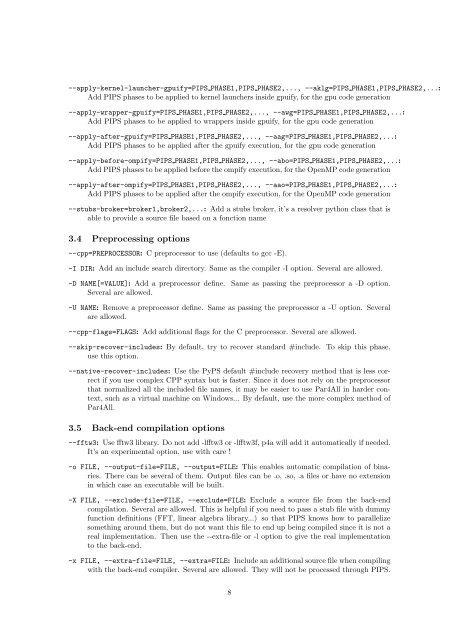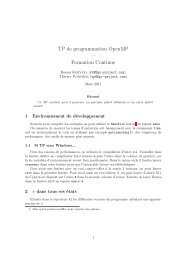Par4All Command Line Interface p4a — HPC Project
Par4All Command Line Interface p4a — HPC Project
Par4All Command Line Interface p4a — HPC Project
You also want an ePaper? Increase the reach of your titles
YUMPU automatically turns print PDFs into web optimized ePapers that Google loves.
--apply-kernel-launcher-gpuify=PIPS PHASE1,PIPS PHASE2,..., --aklg=PIPS PHASE1,PIPS PHASE2,...:<br />
Add PIPS phases to be applied to kernel launchers inside gpuify, for the gpu code generation<br />
--apply-wrapper-gpuify=PIPS PHASE1,PIPS PHASE2,..., --awg=PIPS PHASE1,PIPS PHASE2,...:<br />
Add PIPS phases to be applied to wrappers inside gpuify, for the gpu code generation<br />
--apply-after-gpuify=PIPS PHASE1,PIPS PHASE2,..., --aag=PIPS PHASE1,PIPS PHASE2,...:<br />
Add PIPS phases to be applied after the gpuify execution, for the gpu code generation<br />
--apply-before-ompify=PIPS PHASE1,PIPS PHASE2,..., --abo=PIPS PHASE1,PIPS PHASE2,...:<br />
Add PIPS phases to be applied before the ompify execution, for the OpenMP code generation<br />
--apply-after-ompify=PIPS PHASE1,PIPS PHASE2,..., --aao=PIPS PHASE1,PIPS PHASE2,...:<br />
Add PIPS phases to be applied after the ompify execution, for the OpenMP code generation<br />
--stubs-broker=broker1,broker2,...: Add a stubs broker, it’s a resolver python class that is<br />
able to provide a source file based on a fonction name<br />
3.4 Preprocessing options<br />
--cpp=PREPROCESSOR: C preprocessor to use (defaults to gcc -E).<br />
-I DIR: Add an include search directory. Same as the compiler -I option. Several are allowed.<br />
-D NAME[=VALUE]: Add a preprocessor define. Same as passing the preprocessor a -D option.<br />
Several are allowed.<br />
-U NAME: Remove a preprocessor define. Same as passing the preprocessor a -U option. Several<br />
are allowed.<br />
--cpp-flags=FLAGS: Add additional flags for the C preprocessor. Several are allowed.<br />
--skip-recover-includes: By default, try to recover standard #include. To skip this phase,<br />
use this option.<br />
--native-recover-includes: Use the PyPS default #include recovery method that is less correct<br />
if you use complex CPP syntax but is faster. Since it does not rely on the preprocessor<br />
that normalized all the included file names, it may be easier to use <strong>Par4All</strong> in harder context,<br />
such as a virtual machine on Windows... By default, use the more complex method of<br />
<strong>Par4All</strong>.<br />
3.5 Back-end compilation options<br />
--fftw3: Use fftw3 library. Do not add -lfftw3 or -lfftw3f, <strong>p4a</strong> will add it automatically if needed.<br />
It’s an experimental option, use with care !<br />
-o FILE, --output-file=FILE, --output=FILE: This enables automatic compilation of binaries.<br />
There can be several of them. Output files can be .o, .so, .a files or have no extension<br />
in which case an executable will be built.<br />
-X FILE, --exclude-file=FILE, --exclude=FILE: Exclude a source file from the back-end<br />
compilation. Several are allowed. This is helpful if you need to pass a stub file with dummy<br />
function definitions (FFT, linear algebra library...) so that PIPS knows how to parallelize<br />
something around them, but do not want this file to end up being compiled since it is not a<br />
real implementation. Then use the --extra-file or -l option to give the real implementation<br />
to the back-end.<br />
-x FILE, --extra-file=FILE, --extra=FILE: Include an additional source file when compiling<br />
with the back-end compiler. Several are allowed. They will not be processed through PIPS.<br />
8



